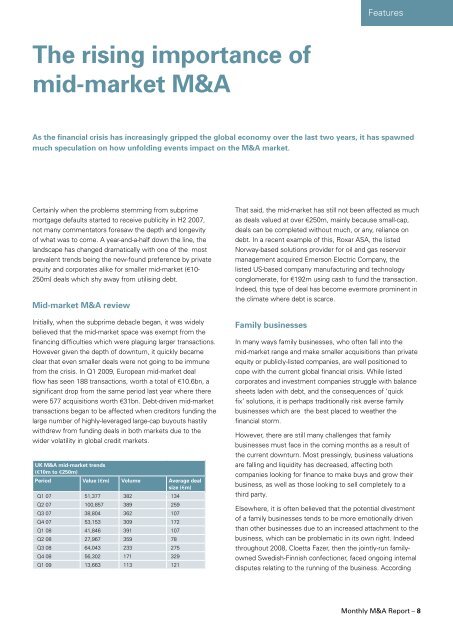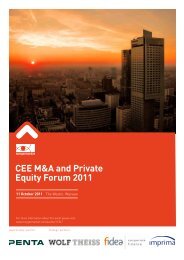Monthly M&A Insider - Mergermarket
Monthly M&A Insider - Mergermarket
Monthly M&A Insider - Mergermarket
You also want an ePaper? Increase the reach of your titles
YUMPU automatically turns print PDFs into web optimized ePapers that Google loves.
The rising importance of<br />
mid-market M&A<br />
Certainly when the problems stemming from subprime<br />
mortgage defaults started to receive publicity in H2 2007,<br />
not many commentators foresaw the depth and longevity<br />
of what was to come. A year-and-a-half down the line, the<br />
landscape has changed dramatically with one of the most<br />
prevalent trends being the new-found preference by private<br />
equity and corporates alike for smaller mid-market (€10-<br />
250m) deals which shy away from utilising debt.<br />
Mid-market M&A review<br />
Initially, when the subprime debacle began, it was widely<br />
believed that the mid-market space was exempt from the<br />
financing difficulties which were plaguing larger transactions.<br />
However given the depth of downturn, it quickly became<br />
clear that even smaller deals were not going to be immune<br />
from the crisis. In Q1 2009, European mid-market deal<br />
flow has seen 188 transactions, worth a total of €10.6bn, a<br />
significant drop from the same period last year where there<br />
were 577 acquisitions worth €31bn. Debt-driven mid-market<br />
transactions began to be affected when creditors funding the<br />
large number of highly-leveraged large-cap buyouts hastily<br />
withdrew from funding deals in both markets due to the<br />
wider volatility in global credit markets.<br />
That said, the mid-market has still not been affected as much<br />
as deals valued at over €250m, mainly because small-cap,<br />
deals can be completed without much, or any, reliance on<br />
debt. In a recent example of this, Roxar ASA, the listed<br />
Norway-based solutions provider for oil and gas reservoir<br />
management acquired Emerson Electric Company, the<br />
listed US-based company manufacturing and technology<br />
conglomerate, for €192m using cash to fund the transaction.<br />
Indeed, this type of deal has become evermore prominent in<br />
the climate where debt is scarce.<br />
Family businesses<br />
Features<br />
As the financial crisis has increasingly gripped the global economy over the last two years, it has spawned<br />
much speculation on how unfolding events impact on the M&A market.<br />
UK M&A mid-market trends<br />
(€10m to €250m)<br />
Period Value (€m) Volume Average deal<br />
size (€m)<br />
Q1 07 51,377 382 134<br />
Q2 07 100,857 389 259<br />
Q3 07 38,804 362 107<br />
Q4 07 53,153 309 172<br />
Q1 08 41,846 391 107<br />
Q2 08 27,967 359 78<br />
Q3 08 64,043 233 275<br />
Q4 08 56,302 171 329<br />
Q1 09 13,663 113 121<br />
In many ways family businesses, who often fall into the<br />
mid-market range and make smaller acquisitions than private<br />
equity or publicly-listed companies, are well positioned to<br />
cope with the current global financial crisis. While listed<br />
corporates and investment companies struggle with balance<br />
sheets laden with debt, and the consequences of ‘quick<br />
fix’ solutions, it is perhaps traditionally risk averse family<br />
businesses which are the best placed to weather the<br />
financial storm.<br />
However, there are still many challenges that family<br />
businesses must face in the coming months as a result of<br />
the current downturn. Most pressingly, business valuations<br />
are falling and liquidity has decreased, affecting both<br />
companies looking for finance to make buys and grow their<br />
business, as well as those looking to sell completely to a<br />
third party.<br />
Elsewhere, it is often believed that the potential divestment<br />
of a family businesses tends to be more emotionally driven<br />
than other businesses due to an increased attachment to the<br />
business, which can be problematic in its own right. Indeed<br />
throughout 2008, Cloetta Fazer, then the jointly-run familyowned<br />
Swedish-Finnish confectioner, faced ongoing internal<br />
disputes relating to the running of the business. According<br />
<strong>Monthly</strong> M&A Report – 8




![mergermarket [TITLE OF RELEASE TO GO HERE] 3 January 2013 ...](https://img.yumpu.com/11701841/1/190x135/mergermarket-title-of-release-to-go-here-3-january-2013-.jpg?quality=85)












